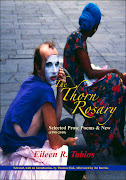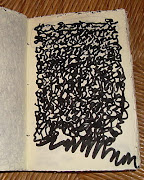I've always felt that the Poem is only begun by its author, and that it needs to be completed by its reader or audience. I'm pleased to share the latest incarnation of a completed poem by Cynthia M. Phillips: jewelry!!!! Gal's after my own heart! Here are pics--the first on the kitchen island, next to photos of my beloved cats Artemis and Scarlet:

Second photo of me wearing them as I pick up a bronze figurine that once resided with brilliant poet kari edwards:

Cynthia, the jewelry designer, explains some of the conceptual underpinnings to the purty bracelets--
1) Haiti--red: blood. Green for rebirth and renewal
2) "I consider the woman's choice in liberating / a red dress with pale green sandals" (a line from a poem in Beyond Life Sentences / later in THE THORN ROSARY)
I love it -- am so particularly happy when artists take on some of my poems...Thank you, Cynthia! And I'm cutnpasting below an excerpt from my presentation at the Literature Panel for the Babaylan Conference that relates as well to Cynthia's engagement--
--which also explains why, when I do gigs, I like to rip up my poetry books!!! To wit:
from "Dawac/Action: Babaylan Poetics" (with performance notes for Tearing Up Book!):
In the Philippines’ central Ilocos Sur area where I was born, the Babaylan is known as Man-nawac. “Man-nawac,” from the Itneg language, can be translated as “a healer and caller of spirits.” The Man-nawac heals by invoking the help of the anitos or spirits.
I learned about the Man-nawac from my mother who shared how she, as a child, once witnessed a Man-nawac heal her grandmother. This Man-nawac was also a relative: Apo Ak-kam. In terms of ars poetica, three points reverberated with me from my mother’s account of Apo Ak-kam’s process:
First, the healing process involved the Man-nawac calling to the spirits through statements (“Please come, please come…”) to almost ululating sounds (“woooo…wooo…woooo”). In other words, the Man-nawac does not heal others on her own; she calls to others—she must involve others.
Second, the healing process had to begin on or about high noon. My mother said that noon was the time when the most people in the community would hear the Man-nawac’s calls to the spirits. For me, the significance of noon relates to maximum light and maximum involvement of the community (versus a time like, say, midnight when most people would be asleep).
Third, while the Man-nawac was calling for the spirits to help heal my mother’s grandmother, my mother’s grandfather was on the other side of a curtain where he stood with five beaded strings. Five times, my mother’s grandfather would raise a beaded string over the curtain and each time the Man-nawac would cut off one string, releasing the beads from their tether. By the third time that the Man-nawac cut a beaded string, it was clear that the Man-nawac was “fully possessed” by the spirits….and on through to the cutting of the fifth string. For me, this relates to how, I conceive of a poem’s creation as one where the poet’s role is not to write the poem so much as to be the tool through which a poem is written. The poem writes itself—as Jose Garcia Villa once noted, I believe, about the author’s hands, “The,hands,on,the,piano,are,armless,”. The poem is more than the poet.
As a poet, I call out to you through poems. I don’t consider (my) poems to be art objects—things to be read or looked at from a distance. I offer the poem as an open hand, a space for engagement with others. If no one reaches forth to take my hand, if no one found my poem sufficiently engaging or of interest, then the poem never reached fruition.
And this is why, I approach you now with poems, these from my book Nota Bene Eiswein:
[Tear sheets from Nota Bene Eiswein and hand out to people in audience, explaining...]
1) My poems don’t mature if they remain unread, if no one engages with them….so I give them to you.
2) Note that by tearing out pages, I am destroying a book. Well, yes, the publication is not important….the poem may be what’s printed on the page. But Poetry is not something trapped by a page; it’s an engagement involving others beyond its author.
3) When I give you pages, they may be fragments – incomplete excerpts of poems…that’s fine. A poem is inherently a fragment—it is began by the author, but it can only mature into wholeness if it’s engaged by a reader; an audience.
Poetry is verb. A poem may be words. But Poetry is an act. Poetry is engagement.



5 comments:
dearest Eileen,
Oh, I am so honored My veins
are plump with joy, that you have
found my bracelets to give you
pleasure and contribute to the
breath of poetry.
And yes the healing, must include
more than just a desire, but others who come together. Noon is
the perfect time, when the community is alert and alive and
most important wanting, giving
and relating to the need of healing.
I've carried your poem "Faith"
around with me ever since you
mailed me your heart-awakening
book: The Thorn Rosary.
Love: " And we are free with each
other though we cannot memorize
each other' scent...Love as pure
form? ... And no-Self is a Self...
these words haunt me, Eileen,
I will never discern them fully
but my desire, joy and learning
will be within these lines.
Thank you!
Oh Cynthia!
I am so pleased to be plumping up your veins. I am picturing them all a-wriggly with happiness!
Thank you for mentioning "Faith"...it's always nice to know which poem is affecting someone. "Faith" -- the entire "Conjurations" series -- is among my favorites but has never really gotten much attention. You are showing that those poems yet may find their homes in future readers. I appreciate the gift of realizing this, from you!
And now my veins are seeking to be plumped with wine...
best,
Eileen
Of course, poems never evaporate
they simply helicopter over certain
reader's sensibilities.
At the risk of sounding like a
plebe, is conjurations, the series?
is this another form of the word
conjure, thus meaning to conjure?
I am so there, or was last night
Saturday, a glass of wine, a good
book, and the cool breeze tickling
my curtains.
Hi Cynthia,
A good glass of wine -- yes!
Tonight, finally popped open a bottle that had been given to us by friends who are happily making wine in their basement. I popped it because (grin) I was making chicken in red wine sauce. Of course, I tried a glass as well. Let's just say, the wine tasted better when baked for over an hour with chicken, oregano, garlic, brown sugar, ground ginger, soy sauce, cooking oil and un pollo...Fortunately, another bottle was ready to give me a good glass of wine!
Yes, the poem "Faith" was part of the series "Conjurations" that I'd written to, uh, write-create a new reality. Nuff said on that! :-)
Eileen
Hi Eileen, my gosh this recipe sounds utterly delish! I have
to cook next Sunday and this will
be my choice- love the flavors -
an Asian and Latin combo -yumyum.
"Conjurations" written to
write-create a new reality". That
is one of the seductive aspects
of writing poetry/prose the ability
to write into creation another
reality. To enjoy elastic boundaries that allow the writer
and the reader to experience
something, something that perhaps
can't be put into words, but
resonates within the poet and
the reader.
Post a Comment